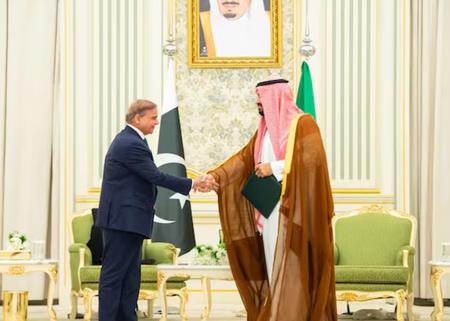
Will Study Implications For National Security: India On Saudi-Pakistan Defence Pact
The pact was signed in Riyadh by Pakistani Prime Minister Shehbaz Sharif and Saudi Crown Prince Mohammed bin Salman on Wednesday, when both sides agreed that an attack on one would be considered an attack on both.
In response, the Ministry of External Affairs (MEA) issued a statement saying, "We have seen reports of the signing of a strategic mutual Defence pact between Saudi Arabia and Pakistan. The Government was aware that this development, which formalises a long-standing arrangement between the two countries, had been under consideration."
"We will study the implications of this development for our national security as well as for regional and global stability. The Government remains committed to protecting India's national interests and ensuring comprehensive national security in all domains," it added.
The 'Strategic Mutual Defence Agreement' marks the most formal expression of a decades-long security relationship that has seen Pakistan training Saudi troops and participating in joint exercises since the 1960s. A joint statement from Riyadh and Islamabad said the accord aims to "develop aspects of Defence cooperation" and "strengthen joint deterrence against any aggression."
The development comes shortly after the Pahalgam attack in which 26 people were killed by heavily armed terrorists of The Resistance Front, an offshoot of Pakistan-based Lashkar-e-Taiba.
In retaliation, India launched 'Operation Sindoor', targeting nine high-value terror infrastructures in Pakistan and Pakistan-occupied-Kashmir (PoK). Pakistan later responded with counterstrikes, raising tensions further.
India subsequently rolled out 'Operation Sindoor Outreach', sending delegations of parliamentarians and officials to friendly nations to highlight Pakistan's state-sponsored terrorism. One such delegation, led by BJP MP Baijayant Panda, visited Saudi Arabia as part of this campaign.
The Defence pact also coincides with a wider climate of instability in the region.
Just two days earlier, Arab and Islamic nations convened an extraordinary joint session of the Arab League and Organisation of Islamic Cooperation (OIC) after Israel's September 9 airstrike in Doha killed senior Hamas political leaders during ceasefire talks. The strike drew condemnation across Arab capitals.

Legal Disclaimer:
MENAFN provides the
information “as is” without warranty of any kind. We do not accept
any responsibility or liability for the accuracy, content, images,
videos, licenses, completeness, legality, or reliability of the information
contained in this article. If you have any complaints or copyright
issues related to this article, kindly contact the provider above.


















Comments
No comment